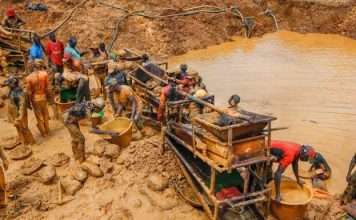Living in proximity to dump sites has been linked to various hazards, with one particular concern being the potential risk of offspring experiencing diminished intelligence quotient and short-term memory impairments.
According to experts raising this concern, exposure to radioactive substances in such locations increases the likelihood of developing conditions like hearing impairment, kidney-related issues, and lead poisoning in children.
Physicians have recommended putting an end to illegal mining activities in the country in response to these issues.
An Australian health blog, One Central Health, explained that intelligence quotient is a measure of an individual’s cognitive abilities, often assessed through an IQ test.
A 2017 report by the United Nations Children’s Fund indicated that 80% of a child’s IQ is influenced by their environment, suggesting that children raised in polluted or crisis-affected areas may face challenges in developing intelligence despite they genetic background. “will not be intelligent no matter the gene of their parents.”
Recently, Wakadaily covered an emergency meeting called by Dr. Jide Idris, the Director-General of the Nigeria Centre for Disease Control and Prevention, to address an unknown illness outbreak in Sokoto and Zamfara states.
The NCDC reported 196 suspected cases of the mysterious illness, resulting in seven deaths across six wards in Sokoto State. Initial evaluations and investigations conducted at the Uthman Dan Fodio University Teaching Hospital in Sokoto ruled out an infectious source for the illness.
Dr. Idris mentioned that preliminary tests for heavy metals conducted on the index case and several early suspected cases revealed varying levels of lead and chromium in their bloodstreams.
The observed activities in the affected communities included mining, agricultural practices involving the use of chemicals and pesticides, as well as health-seeking behaviors and community practices that could potentially be harmful to public health.
“This also contributes to the deposition and build-up in soils. Heavy metals can also contaminate water sources and get into plants if they persist in the soil. Exposure to heavy metals either through the air (dust), soil, plants, or water is associated with kidney, brain, liver, and bone damage including cancers of the body depending on the type of heavy metals.
“Persons most at risk or vulnerable include pregnant women (unborn babies), infants and children, illegal/artisanal miners, industrial workers, etc. Some of the effects of heavy metals are immediate while many will take a long time to manifest,” Idris stated.
The National Center for Disease Control (NCDC) stated that harmful metals such as cadmium, chromium, lead, and mercury are primarily released into the atmosphere as a result of various industrial activities, particularly mining in areas with lax regulations.
Illegal mining, as defined by the United Nations Office on Drugs and Crime (UNODC), involves operations conducted by individuals, entities, or groups that do not comply with the laws and regulations governing such activities. This includes working in restricted areas or using forbidden equipment, tools, or chemicals.
The UN agency also highlighted the negative impact of illegal mining and trafficking of precious metals on peace, stability, security, environment, and the economy. This was further emphasized by President Bola Tinubu, who mentioned that the proceeds from illegal mining have been used by terrorists to finance their operations.
According to the speaker of the Economic Community of West African States Parliament, Mohamed Tunis, illegal mining activities not only disrupt peace but also deprive the country of 91 percent of the revenue that should be generated by the mining sector.
In a tragic incident in Oyo State, illegal miners storing explosive devices in a residential area caused an explosion that resulted in five deaths, 77 injuries, and the destruction of 58 houses.
Dr. Rabiu Jalo, a Senior Lecturer and Consultant Public Health Physician, warned that residents living near illegal mining sites are at a higher risk of lead poisoning, which is a major cause of intellectual disability in children. He also highlighted the exposure of these residents to radioactive materials and heavy metals, contributing to approximately 0.6 percent of the global disease burden annually.
“The defects are multi-faceted and affect several parts of the body system. One, it affects the Central Nervous System, which appears to be the chief target, especially in children. It can affect their intelligence quotient, intellect growth, short-term memory and hearing loss in some instances.
“Secondly, it affects the blood system, which for instance reduces the synthesis of the production of haemoglobin – the main ingredient in the blood and can cause anaemia. Another important body part that is affected is the kidneys.
“Unfortunately, lead, which is called cumulative poisoning, tends to have a lot of effects on humans. It can be obtained via ingestion, inhalation and skin contact. The majority of heavy metals including lead affect the kidney,” the physician Stated.
In 2010, he highlighted that Zamfara State witnessed the initial case of lead poisoning caused by illegal mining, resulting in an outbreak of anaemia and kidney issues in children who were involved in mining activities.
The expert in public health also pointed out that both men and women living near illegal mining sites faced the risk of infertility, while pregnant women were vulnerable to premature delivery, miscarriage, and harm to the unborn child.
In discussing future actions, Jalo emphasized the need for sustainable public health campaigns aimed at educating residents about the health hazards linked with illegal mining. He urged the government to enhance surveillance to tackle illegal mining operations and clean up polluted environments.
The physician also stressed the importance of providing treatment to affected individuals and enacting laws to ensure safe mining practices for occupational safety and hygiene in all mining areas.
Additionally, a public health doctor at the Irrua Specialist Teaching Hospital, Dr. Ekaete Tobin, called for increased efforts to combat illegal mining activities and implement strategies for the gradual recovery and rehabilitation of affected regions.
